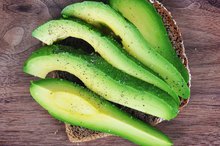What Foods Contain Low Vitamin K Levels?
Vitamin K has many functions, including maintaining bone mass and producing skin cells. It helps prevent cardiovascular disease and also helps blood to clot normally. The only reason you may want to find foods low in vitamin K is if you take prescription anticoagulant medications, such as warfarin 1. Vitamin K encourages blood clotting, while warfarin is a blood thinner 1. Consuming too much vitamin K will prevent your blood thinning medication from working properly. When you plan to eat a larger-than-usual amount of vitamin K, you may want to only consume low levels of vitamin K during the rest of the day. Many foods qualify.
Fruit With Low Vitamin K
Most fruit contains low levels of vitamin K, according to ClotCare 1. You can enjoy berries such as blackberries, blueberries, raspberries and strawberries. If you like melons, feel free to have cantaloupe, honeydew and watermelon. Fruit juice from any of these foods also is acceptable.
- Most fruit contains low levels of vitamin K, according to ClotCare 1.
- If you like melons, feel free to have cantaloupe, honeydew and watermelon.
Vegetables With Low Vitamin K
List of Wheat-Free Foods
Learn More
Green leafy vegetables have high levels of vitamin K, and so do broccoli and asparagus. However, numerous other vegetables contain low amounts, as noted by licensed dietitian Joanne Larsen at the Ask The Dietitian website. Tomatoes, tomato juice and tomato paste are low in vitamin K, as is commercial vegetable juice cocktail. Salad dressings generally are low in vitamin K, so feel free to add them to your salads.
- Green leafy vegetables have high levels of vitamin K, and so do broccoli and asparagus.
- Salad dressings generally are low in vitamin K, so feel free to add them to your salads.
Vitamin K in Animal Products
Meat, dairy products and eggs are low in vitamin K, according to Quality Assured Services 3.
Nuts, Seeds and Legumes
List of Grains With Low GI
Learn More
Nuts, nut butters, seeds and legumes all contain low vitamin K levels, as detailed by Quality Assured Services 3. Any types of nuts are fine, as well as pumpkin, sesame, squash and sunflower seed kernels.
Vitamin K Content of Grains
Eating foods made from grain is another good option when you need to limit vitamin K. Feel free to eat bagels, bread, muffins and other baked goods, as well as crackers and cookies. They can be made from any grains, such as wheat, rye and barley. Noodles, spaghetti and other pasta are acceptable, and so is rice. Oatmeal and commercial cereals are naturally low in vitamin K, but read labels, because some cereals are fortified with this vitamin.
- Eating foods made from grain is another good option when you need to limit vitamin K. Feel free to eat bagels, bread, muffins and other baked goods, as well as crackers and cookies.
Related Articles
References
- ClotCare: Vitamin K and Warfarin
- Ask The Dietitian: Vitamin K and Blood Thinners
- Quality Assured Services: Vitamin K Registry
- Holick MF, Gordon CM. Patient Guide to Vitamin D Deficiency. The Journal of Clinical Endocrinology & Metabolism. 2011;96(7):1-2. doi:10.1210/jcem.96.7.zeg33a
- Sunyecz JA. The use of calcium and vitamin D in the management of osteoporosis. Ther Clin Risk Manag. 2008;4(4):827-836. doi:10.2147/tcrm.s3552
- Giovannucci E, Liu Y, Hollis BW, Rimm EB. 25-hydroxyvitamin D and risk of myocardial infarction in men: a prospective study. Arch Intern Med. 2008;168(11):1174-1180. doi:10.1001/archinte.168.11.1174
- Gorham ED, Garland CF, Garland FC, et al. Optimal vitamin D status for colorectal cancer prevention: a quantitative meta analysis. Am J Prev Med. 2007;32(3):210-216. doi:10.1016/j.amepre.2006.11.004
- Lappe JM, Travers-Gustafson D, Davies KM, Recker RR, Heaney RP. Vitamin D and calcium supplementation reduces cancer risk: results of a randomized trial. The American Journal of Clinical Nutrition. 2007;85(6):1586-1591. doi:10.1093/ajcn/85.6.1586
- Prentice RL, Pettinger MB, Jackson RD, et al. Health risks and benefits from calcium and vitamin D supplementation: Women’s Health Initiative clinical trial and cohort study. Osteoporos Int. 2013;24(2):567-580. doi:10.1007/s00198-012-2224-2
- Urashima M, Segawa T, Okazaki M, Kurihara M, Wada Y, Ida H. Randomized trial of vitamin D supplementation to prevent seasonal influenza A in schoolchildren. Am J Clin Nutr. 2010;91(5):1255-1260. doi:10.3945/ajcn.2009.29094
- Salehpour A, Hosseinpanah F, Shidfar F, et al. A 12-week double-blind randomized clinical trial of vitamin D₃ supplementation on body fat mass in healthy overweight and obese women. Nutr J. 2012;11:78. doi:10.1186/1475-2891-11-78
- Carrillo AE, Flynn MG, Pinkston C, et al. Impact of vitamin D supplementation during a resistance training intervention on body composition, muscle function, and glucose tolerance in overweight and obese adults. Clin Nutr. 2013;32(3):375-381. doi:10.1016/j.clnu.2012.08.014
- Marcinowska-Suchowierska E, Kupisz-Urbańska M, Łukaszkiewicz J, Płudowski P, Jones G. Vitamin D Toxicity-A Clinical Perspective. Front Endocrinol. 2018;9:550. doi:10.3389/fendo.2018.00550
- Ross AC, Manson JE, Abrams SA, et al. The 2011 report on dietary reference intakes for calcium and vitamin D from the Institute of Medicine: what clinicians need to know. J Clin Endocrinol Metab. 2011;96(1):53-58. doi:10.1210/jc.2010-2704
- Bouillon R, Van Schoor NM, Gielen E, et al. Optimal vitamin D status: a critical analysis on the basis of evidence-based medicine. J Clin Endocrinol Metab. 2013;98(8):E1283-E1304. doi:10.1210/jc.2013-1195
- American Academy of Dermatology. Position Statement of Vitamin D. 2010.
- Taksler GB, Cutler DM, Giovannucci E, Keating NL. Vitamin D deficiency in minority populations. Public Health Nutr. 2015;18(3):379-391. doi:10.1017/S1368980014000457
- Holick MF, Binkley NC, Bischoff-Ferrari HA, et al. Evaluation, treatment, and prevention of vitamin D deficiency: an Endocrine Society clinical practice guideline. J Clin Endocrinol Metab. 2011;96(7):1911-1930. doi:10.1210/jc.2011-0385
- Cannell JJ, Vieth R, Umhau JC, et al. Epidemic Influenza and Vitamin D. Epidemiol Infect. 2006; 134:1129-40.
- Carrillo AE1, Flynn MG, Pinkston C, Markofski MM, Jiang Y, Donkin SS, Teegarden D. Impact of Vitamin D Supplementation During a Resistance Training Intervention on Body Composition, Muscle Function, and Glucose Tolerance in Overweight and Obese Adults. Clin Nutr. 2013 Jun;32(3):375-81. doi: 10.1016/j.clnu.2012.08.014. Epub 2012 Aug 31.
- Ginde AA, Mansbach JM, Camargo CA, Jr. Association Between Serum 25-Hydroxyvitamin D Level and Upper Respiratory Tract Infection in the Third National Health and Nutrition Examination Survey. Arch Intern Med. 2009; 169:384-90.
- Giovannucci E, Liu Y, Hollis BW, Rimm EB. 25-hydroxyvitamin D and Risk of Myocardial Infarction in Men: a Prospective Study. Arch Intern Med. 2008; 168:1174-80.
- Gorham ED, Garland CF, Garland FC, Grant WB, Mohr SB, Lipkin M, Newmark HL, Giovannucci E, Wei M, Holick MF. Optimal Vitamin D Status for Colorectal Cancer Prevention: a Quantitative Meta-analysis. Am J Prev Med. 2007 Mar;32(3):210-6.
- Heaney, Robert P. “The Vitamin D Requirement in Health and Disease.” The Journal of Steroid Biochemistry & Molecular Biology 97 (2005):13-9.
- Holick MF. Vitamin D. In: Shils M, Olson J, Shike M, Ross AC, ed. Modern Nutrition in Health and Disease, 9th ed. Baltimore: Williams and Wilkins, 1999.
- National Institutes of Health Office of Dietary Supplements. Vitamin D: Dietary Supplement Fact Sheet. University of Ottawa Evidence-based Practice Center. Effectiveness and Safety of Vitamin D in Relation to Bone Health. Agency for Healthcare Research and Quality. Aug 2007: 07-E013.
- Salehpour A1, Hosseinpanah F, Shidfar F, Vafa M, Razaghi M, Dehghani S, Hoshiarrad A, Gohari M. A 12-week Double-blind Randomized Clinical Trial of Vitamin D₃ Supplementation on Body Fat Mass in Healthy Overweight and Obese Women. Nutr J. 2012 Sep 22;11:78. doi: 10.1186/1475-2891-11-78.
- Urashima M, Segawa T, Okazaki M, Kurihara M, Wada Y, Ida H. Randomized Trial of Vitamin D Supplementation to Prevent Seasonal Influenza A in Schoolchildren. Am J Clin Nutr. 2010 91:1255-60. Epub 2010 Mar 10.
- Wilkins, Consuelo H. and Yvette I. Sheline, et al. “Vitamin D Deficiency Is Associated with Low Mood and Worse Cognitive Performance in Older Adults.” American Journal of Geriatric Psychiatry 14 (2006): 1032-40.
Writer Bio
Shelley Moore is a journalist and award-winning short-story writer. She specializes in writing about personal development, health, careers and personal finance. Moore has been published in "Family Circle" magazine and the "Milwaukee Sentinel" newspaper, along with numerous other national and regional magazines, daily and weekly newspapers and corporate publications. She has a Bachelor of Science in psychology.









